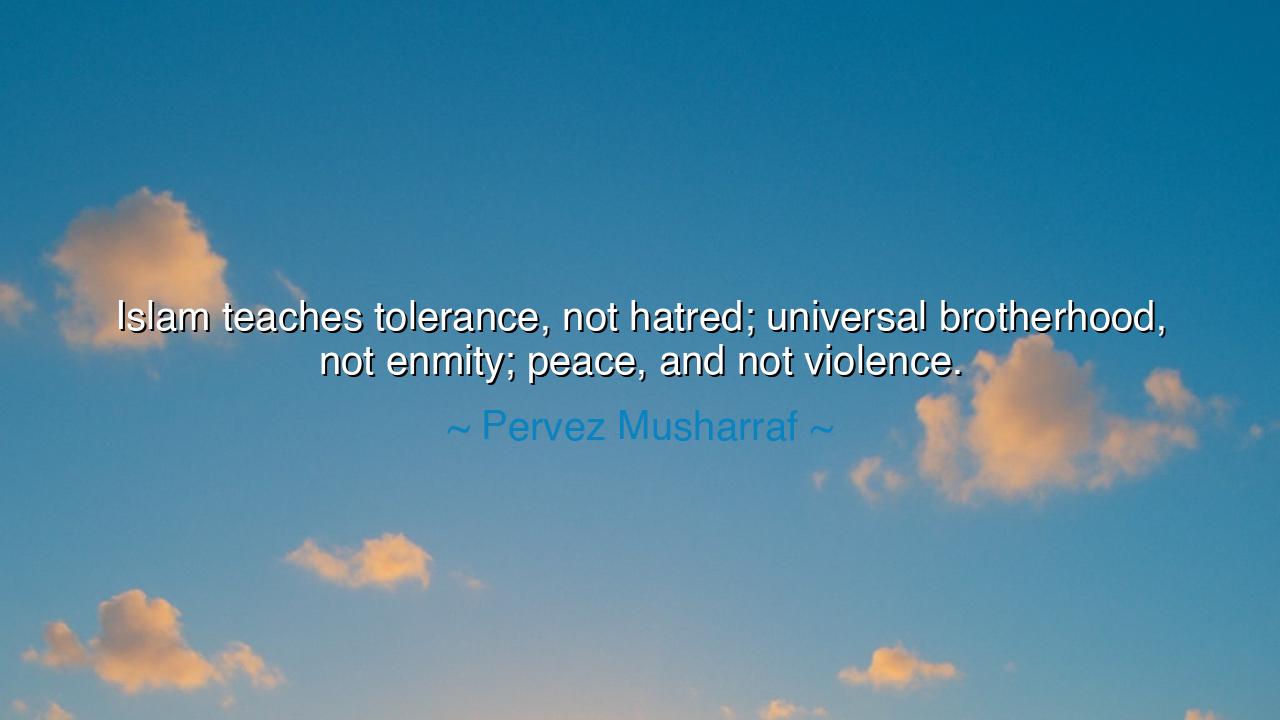
Islam teaches tolerance, not hatred; universal brotherhood, not
Islam teaches tolerance, not hatred; universal brotherhood, not enmity; peace, and not violence.






The words of Pervez Musharraf—“Islam teaches tolerance, not hatred; universal brotherhood, not enmity; peace, and not violence”—resound as both a defense and a reminder. They are the words of a leader who sought to call men back to the true heart of a faith often misunderstood, both by outsiders who fear it and by those within who twist it for power. In this declaration, Musharraf sought to reclaim the essence of Islam, not as a creed of division or war, but as a path of mercy, harmony, and unity.
The origin of this saying lies in a time when the name of Islam had become entangled with violence in the eyes of the world. Terrorism, extremism, and the misuse of faith for political ambition had painted a dark shadow over its true message. As a general and later president of Pakistan, Musharraf stood at a crossroads: balancing the demands of modernity and tradition, of East and West. His words came as both reassurance to a fearful world and a call to Muslims themselves to remember what their religion truly teaches.
History itself testifies to this truth. In the golden age of Islam, from Baghdad to Córdoba, societies flourished where Jews, Christians, and Muslims lived side by side, trading knowledge, ideas, and discoveries. It was under the banner of tolerance that philosophy, medicine, and mathematics advanced, enriching the entire world. The scholars of that time lived by the principle of universal brotherhood, knowing that wisdom belonged to no single people but was a trust shared by all humanity. Where tolerance reigned, light spread; where enmity took root, darkness followed.
The meaning of Musharraf’s words is a call to reject distortion. For hatred, though it may clothe itself in religion, is never of God. Violence, though it may speak the language of justice, is in truth only destruction. But peace, born of compassion, born of the recognition that every man and woman is part of the same human family, is the true teaching of Islam—and indeed, the teaching of all who seek the Divine. His words are not only about Islam, but about the eternal struggle to distinguish the heart of faith from the poison of misuse.
Consider the story of the Treaty of Hudaybiyyah, when the Prophet Muhammad, though urged to fight, chose peace over war with his adversaries. That choice of peace won more hearts than any battle could have conquered, and within a few years, those once opposed came willingly into the fold of brotherhood. This real moment from history reveals the spirit Musharraf described: that peace bears greater fruit than violence, and tolerance achieves what hatred never can.
The lesson for us is clear: never allow faith—whether Islam, Christianity, Judaism, or any other path—to be stolen by the voices of hate. Look always to the fruits: if it divides, it is false; if it heals, it is true. True religion must build bridges, not burn them. And true belief must see every man as a brother, every woman as a sister, every child as a sacred trust. To live otherwise is to betray the God who made us all.
Practically, let us put this wisdom into action. In our homes, practice tolerance with those who differ in thought or belief. In our communities, work for peace, not by avoiding conflict but by addressing it with compassion and fairness. In our own hearts, uproot hatred before it poisons the soul. And above all, live as if every stranger were already your brother, every enemy already your neighbor, every human being already bound to you by one Creator.
Thus, Musharraf’s words endure as both shield and sword: a shield against false accusations, and a sword against ignorance and misuse. “Islam teaches tolerance, not hatred; universal brotherhood, not enmity; peace, and not violence.” Let us take them to heart, for they are not only a defense of one faith, but a truth that the whole of humanity must embrace if it is to survive: that only in tolerance, in brotherhood, and in peace can we fulfill the highest call of the human spirit.






AAdministratorAdministrator
Welcome, honored guests. Please leave a comment, we will respond soon